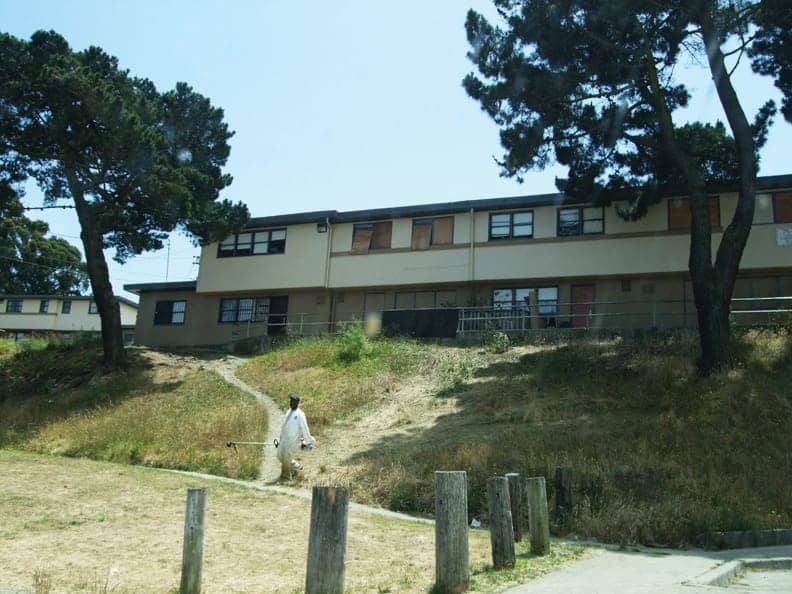by Tamara Barak Aparton and Rebecca Farmer
San Francisco – A judicial decision handed down today effectively ends the San Francisco Housing Authority’s use of city-wide nuisance injunctions and dismisses all pending criminal cases against alleged violators, San Francisco Public Defender Jeff Adachi and ACLU of Northern California Legal Director Alan Schlosser announced.

In the past four years, the Housing Authority has sought civil stay-away orders against 126 individuals whom its officials deemed to be nuisances. Default judgments were granted against 75 people. None was represented by legal counsel and most complaints were not based on criminal convictions. Every injunction is identical; all 75 people are “ordered to stay away at least 150 yards from any and all San Francisco Housing Authority property, perpetually.”
Marcus Johnson, a San Francisco father of two who was represented jointly by the Public Defender and the ACLU of Northern California, challenged the law after being arrested for contempt of court four times in seven months for violating the injunction that was issued against him in February 2010. At the time of each arrest, Johnson was visiting his young children, who live with their mother in the Yerba Buena Plaza East development in the Western Addition.
“At a time when too many fathers fail to be involved in their children’s lives, Johnson is apparently trying to fulfill this important role. But the SFHA injunction bars that involvement from occurring in the home,” Ulmer wrote.
Deputy Public Defender Anne Irwin, who co-wrote the brief challenging the constitutionality of the practice, noted that the Housing Authority’s injunctions were the most restrictive in San Francisco. Unlike the city’s gang injunctions, which bar certain behaviors inside the restricted zones, the Housing Authority’s orders banish people completely and permanently from coming within 150 yards of any of the 53 Housing Authority properties located throughout San Francisco
Ulmer noted that the injunction barred Johnson from large swaths of his hometown, interfering not only with his ability to rear his children, but his ability to work, worship, eat and associate with family and friends – “in short, to exist in San Francisco.”
The civil complaint filed against Johnson by the Housing Authority did not contend that he was convicted of any crime, Ulmer noted, and the Housing Authority opted for a civil proceeding, which resulted in no contested hearing, live witnesses or cross examination.
“It is easy to say Johnson should have defended himself in civil court, but this asks a low-income person to … pay for a lawyer with money he may not have,” Ulmer wrote.
Adachi cheered the verdict as a victory for civil rights.
“Mr. Johnson should be free to visit his children without the threat of being arrested simply for being inside their home,” Adachi said. “Judge Ulmer’s decision reinforces that the right to due process is guaranteed to everyone, no matter their income level.”
“Mr. Johnson should be free to visit his children without the threat of being arrested simply for being inside their home,” Public Defender Jeff Adachi said. “Judge Ulmer’s decision reinforces that the right to due process is guaranteed to everyone, no matter their income level.”
Schlosser said the injunctions “blatantly disregarded fundamental constitutional rights.” While pending criminal charges resulting from allegedly violating the injunction were dismissed against seven people, those bound by past judgments may have to go to court in order to return to Housing Authority property.
“There are approximately 50 individuals who are living under the same injunction and we are working to lift this unconstitutional burden from people who have never had their day in court,” Schlosser said
Chief Attorney Matt Gonzalez of the Public Defender’s Office said the decision exposed a wildly unconstitutional practice that flew under the public’s radar for years.
“While the city’s gang injunctions received a lot of attention, the Housing Authority was quietly barring San Franciscans from large chunks of their city, whether or not they had been convicted of any crime,” Gonzalez said.
“While the city’s gang injunctions received a lot of attention, the Housing Authority was quietly barring San Franciscans from large chunks of their city, whether or not they had been convicted of any crime,” said Matt Gonzalez.
Meredith Desautels, an attorney with the Lawyers’ Committee for Civil Rights of the San Francisco Bay Area, was also involved in challenging the injunctions. Desautels today said the judge’s decision has broad implications for the future of civil injunctions.
“Injunctions are simply too blunt a tool to address the very important concerns of neighborhood stability and safety in a way that properly balances fundamental constitutional rights,” Desautels said. “As Mr. Johnson’s case makes clear, the desire to effectuate public safety goals through the civil court system is misguided and a waste of public resources.”
On May 23, the San Francisco District Attorney’s Office filed a notice with Judge Ulmer, stating prosecutors would not oppose the constitutional challenge to the injunctions.
Tamara Barak Aparton, communications and policy assistant for the San Francisco Public Defender’s Office, can be reached at Tamara.Aparton@sfgov.org. Rebecca Farmer is media relations director for the American Civil Liberties Union of Northern California. Judge Ulmer’s May 25 ruling is posted at http://sfpublicdefender.org/files/2011/05/525JudgeUlmerOpinion.pdf.





